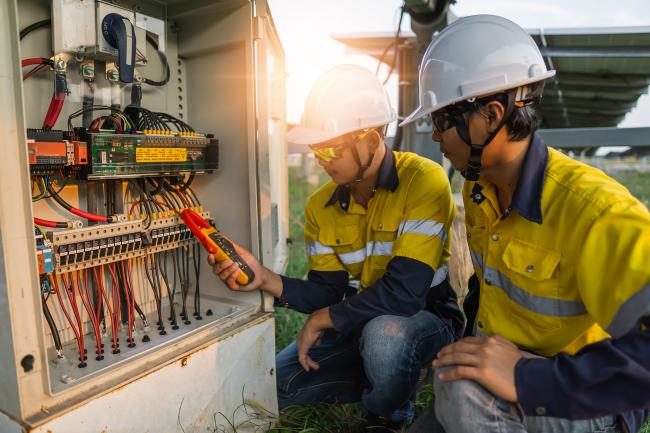Electricity is a big part of our everyday lives. Electricity is power that supplies computers, household appliances, medical equipment, airplanes, and (very soon) automobiles. Electricity travels at the speed of light, about 300,000 kilometers per second. There are two terms to be mindful of: A/C and D/C. A/C is alternating current and D/C is direct current. Have you ever wondered about the difference between batteries and electricity from wall outlets, or how to make a circuit? A circuit is a path that electricity flows along. It starts at a power source, like a battery, and flows through a wire to a light bulb or other object and back to other side of the power source
Exploring 4-H Electricity
Electricity Spark Activity: Fruit Battery
Build a battery out of fruit and explore how electric circuits work and whether or not chemical reactions create electricity (they do).
Materials: Citrus fruit (lemons, limes, oranges) Galvanized (zinc coated) nails Copper pennies Alligator clips LED light
Directions
- Give your citrus fruit a quick roll to make sure the insides are extra juicy.
- Carefully use a knife or scissors to cut two slots/holes in opposite ends of the fruit
- Insert the copper penny and the zinc nail into the pre-made holes.
- Connect the nail and the coin (your electrodes) with the alligator clips. Make sure that one end is attached to the nail and the other to the coin.
- Once you’ve joined up the citrus fruit battery you should be left with two free clips at either end – one coming from the nail and the other coming from the coin.
- To complete the circuit, attach the clips to the LED.
Tip: If you hook up the LED and it doesn’t glow, switch the alligator clips attached to its legs Source: “4-H At Home” - National 4-H
4-H Project Levels and Goals
- Identify tools and parts used in working with electricity
- Learn about safety and equipment used in working with electricity
- Wire a simple circuit
- Test materials for electric conductivity
- Work with electrical equipment and tools
- Identify conductors and insulators
- Build and test circuits; measure voltage; read circuit diagrams
- Develop a basic electrical toolkit
- Understand local electrical code
- Make simple electrical repair
- Identify electrical and electronic parts and devices
- Choose the correct part for a circuit
- Research the influence of electricity on society
- Learn how to solder and prepare parts for assembly
Put Your Project Into Action
Show Your Skills
- Compare fields of study and careers in electricity
- Research the history of energy consumption in the US
- Build an electronic game board
- Display of basic electrical tools and parts
- Display of light bulbs - comparisons and purpose
Service and Leadership
- Exhibit at your school’s science fair
- Start or join a 4-H Robotics club
- Arrange a club tour of a power plant
- Conduct an electricity quiz bowl with your club
- Check homes of family/friends for electricity hazards
- Organize a safety workshop
Entrepreneurship
- Build electronic game boards for local schools or community groups
- Create simple activity kits to teach kids about electricity - market the kits to summer camps, afterschool programs, or parents
Technology Connection
- Smart Home technology
- Use of biomass, solar, or wind to produce electricity
- Wearable electronics
Connecting with a Mentor
- Local electrician
- Electrical engineer
- Local power supply company
- Community college / trade school instructors
Events
- 4-H workshops
- 4-H county and state fair
- Illini Summer Academies - Illinois 4-H
- Community college youth programs
- Youth programs via Electrical Cooperatives
Project Manuals & Exhibit Requirements
- Level 1: Magic of Electricity
- Level 2: Investigating Electricity
- Level 3: Wired for Power
Purchase manuals on the Shop Illinois 4-H Store.
View exhibit requirements and scoresheets on the Illinois State Fair page.
Careers

- Electrician
- Lineworker
- Electrical Technician
- Power Plant Operator
- Electrical Engineer
- Renewable Energy Tech
Start a Conversation
What are all of the ways that you depend on electricity every day? How many different things can you list? What are the most innovative uses of electricity that you can think of? How can you learn more about electrical careers?
Credits
4-H at Home - National 4-H activity guide https://4-h.org/about/4-h-at-home/fruit-batteries
University of Wyoming 4-H project sheet
North Dakota State University Extension 4-H project sheet
Julian Inniss, 4-H Special Interest Coordinator, University of Illinois Extension

